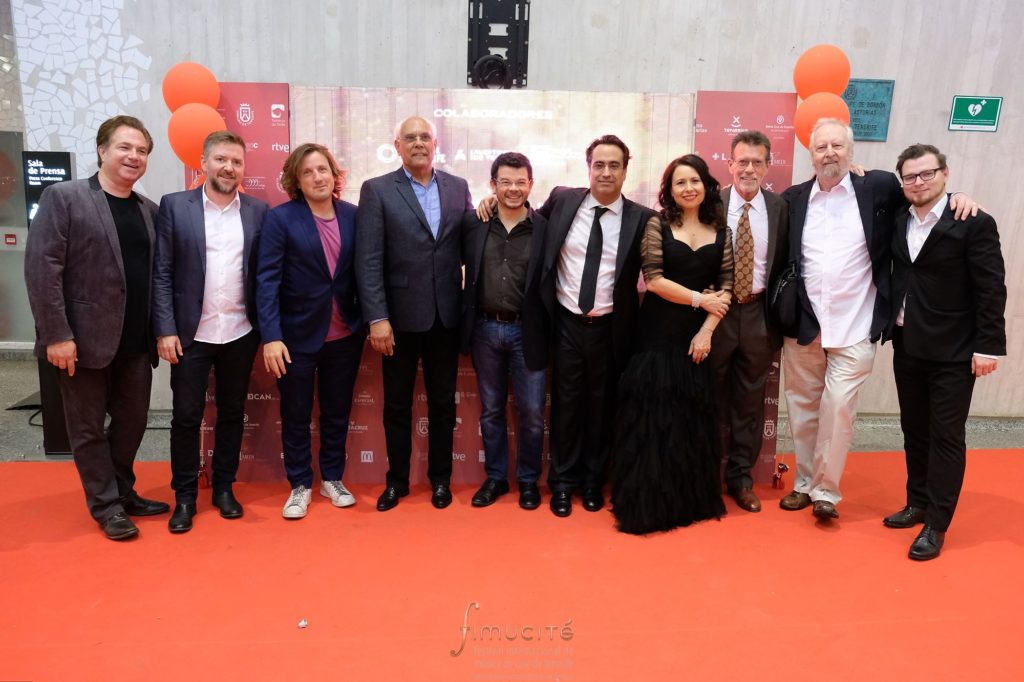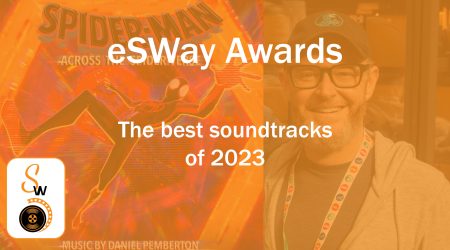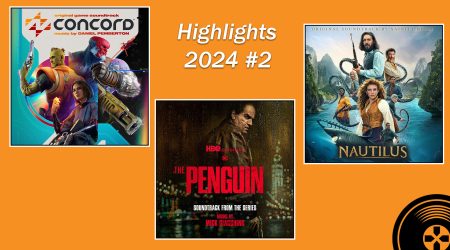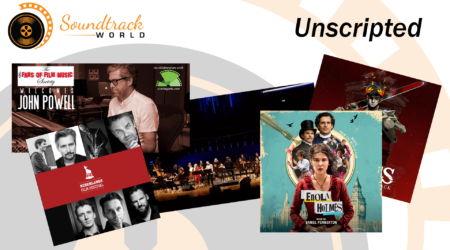At the Fimucité film music festival on Tenerife, I had the honor, and pleasure, to interview three fantastic composers and I want to share the interviews with you in the coming weeks. On 30 September 2017 I spoke with Daniel Pemberton about musical diversity, some deeper thoughts on King Arthur: Legend of the Sword, and his future plans.
To start things off, how did you get into the film music business?
 I work a lot with a TV director called Nick Murphy and he was offered a movie, and some good composers to work with but he chose me, what was really nice of him. I am always grateful for that because he could have taken these other composers, but we have worked together a number of times in television. He knew I would give it everything, so he took me into movies and through his movie, The Awaking, Ridley Scott heard that and then I worked for Ridley Scott. So it was a crazy, very fast moving process that is based on the work. I tried to do really good work for Nick, and then Ridley heard it and liked it and suddenly it is like ‘boom’!
I work a lot with a TV director called Nick Murphy and he was offered a movie, and some good composers to work with but he chose me, what was really nice of him. I am always grateful for that because he could have taken these other composers, but we have worked together a number of times in television. He knew I would give it everything, so he took me into movies and through his movie, The Awaking, Ridley Scott heard that and then I worked for Ridley Scott. So it was a crazy, very fast moving process that is based on the work. I tried to do really good work for Nick, and then Ridley heard it and liked it and suddenly it is like ‘boom’!
Listening to your latest scores, I noticed that they have one thing in common: every score is completely different. How do you start making a score for a movie?
Every time I start a new film, I try to work out how to do this score that would be different and interesting, because that keeps me interested as well. If I can try to find a new way to do something, it becomes part of the challenge, of how to tell this story in a new way. In the end of the day, it is about telling stories but also trying to create a world. If you can come up with different sound worlds, that is really a good way of creating a world for the film. Really good film music is when you hear it away from the film, after seeing the film, will take you back to that world. I think, creating different sonic universes for each project, is really an effective way of doing that. If you always do the same sort of thing and you would hear it, you will not know from which movie it is. Where hopefully, every time you hear one of my scores, you know straight away from which project it is.
I have just done this film with Aaron Sorkin called Molly’s Game, and for that, I wanted to write it a bit more like a band writing the score, rather than sort of a film composer. I approached it more from a rhythmic rock way than a melodic, traditional film composing way. That has been really good fun as well, trying to look for things in different angles.
Here at Fimucité, we could listen to one of your latest scores, King Arthur: Legend of the Sword. How do you feel like when you hear your music being played by a full orchestra – especially when it is a score that is not meant for that?
It is really fascinating. Hearing an orchestra playing your music is always fantastic. Over the last five years, I weirdly sort of have been fighting the idea of writing orchestral music, which I love, but it is very hard to do something that you have not heard before in an orchestra. I use it like a voice alongside many other sounds. What we have today in terms of technology, is very exciting in terms of how you can manipulate sounds: amplifying things and retriggering stuff. I am always interested in how can I try something that I do not have heard and then take the amazing breadth and emotional depth of an orchestra and combine those. It is my holy grail to combine all these things together. The trouble about that means that most of my stuff doesn’t really work live, it is really about the recordings. On King Arthur there will be like small creaks that were turned into rhythm, with a 50-piece orchestra playing behind that. When you are doing it live, you cannot really do that: you get really specific and microscopic. I think it is always a challenge to do a lot of my things live because a lot of my recent melodic and musical cues have not been that complex. It ended up being distilled down to very simple ideas and the sort of excitement in them comes to the production. But at the same time, I have to swing a few more scores a bit more orchestral so that would be easier to play for orchestras.

One of my favorite scenes in King Arthur is the montage scene at the start. How was that created?
On Guy Ritchie’s films, I really work closely with his editor James Herbert, and we talk every day. He throws ideas to me and we talk about things. He is the main collaborator for me on those projects. He came up with the idea about the breathing. I had a track and he tried it over that sequence and he said that it kind of works but that I needed to rework it and we worked together backwards and forwards. He sends me new cuts and I change things, it is always a constant, collaborative process on those sort of sequences between me and James. He is really good at pushing a sequence into something really exciting.
I saw on twitter that you were in Italy to record some local singers, could you elaborate on that?
I am doing Ridley Scott’s new movie called All the Money in the World and it is about kidnappings in 1973. I found these very rural folk music from Sardinia. Before I started the project, I started researching, and I thought it was too far out for the film. I always liked the idea of using it, but when I started to read the script and actually looking at the film, I did not know how it would fit. We ended up managing a small bit in the movie, so I had to go over to Sardinia and drive two hours to a lovely town in the middle of nowhere and record these people I had never met before. I had just seen them in a very bad YouTube clip. It is a really exciting thing to do as a composer because you do not know if it will work at all. It is an exciting process to try and combine all these different worlds into your music.
The final question, what can we expect from you in the near future?
You will get All the Money in the World that is going to be a quite interesting score. It’s got some very big traditional orchestral, operatic, and some uncomfortable, stressful, abstract guitar elements. A film has come out about the Watergate scandal called Mark Felt: The Man Who Brought Down the White House. That score is probably not as exciting to listen to because it is very much a service to the film with bare minimal electronics and piano. The next one is Molly’s Game and has a very diverse score: it’s a rock band, modern sounding soundtrack. It is mainly a band line-up, using hip-hop breaks and post-rock ideas. There is another project I cannot really talk about, it is kind of in the world of Star Trek and it is a very traditional orchestral score. So it will be very interesting to see what people make of that!





One comment
Comments are closed.